diannefeinstein
Latest

Democrats demand more from Facebook and Twitter on #ReleaseTheMemo
Last week, Representative Adam Schiff and Senator Dianne Feinstein asked Facebook and Twitter to investigate whether Russia-linked accounts were involved in spreading the #ReleaseTheMemo campaign. The hashtag refers to a memo written by Republican Representative Devin Nunes that claims the FBI has abused its power. Democrats, however, have maintained that the memo is misleading and largely meant to undermine Special Counsel Robert Mueller's investigation into inappropriate interactions between Russian officials and the Trump administration. Both Facebook and Twitter responded to that letter, but neither Congressperson is satisfied with their answers and they've sent another letter reiterating their requests.

Facebook, Twitter are under pressure to investigate #ReleaseTheMemo
The #ReleaseTheMemo social media campaign swelled last week as many, including Wikileaks and Edward Snowden, called for the memo to be released to the public. Now, two members of Congress are asking Twitter and Facebook to look into a potential Russian role in the viral spread of the hashtag campaign.
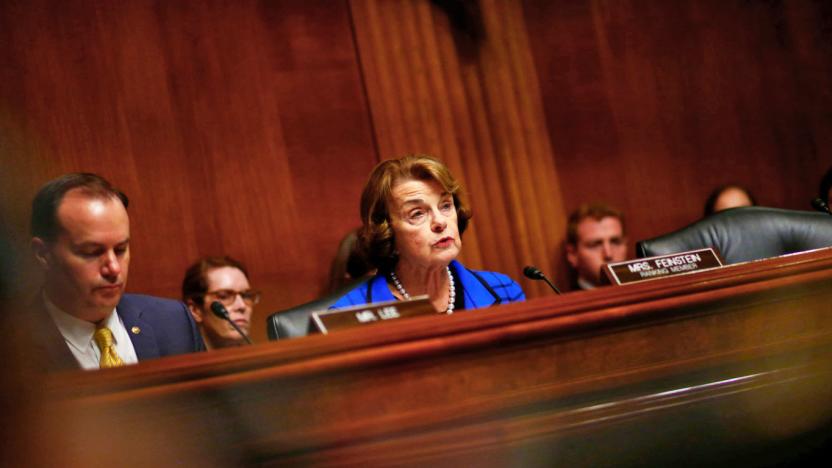
Senator wants more details on Russian Twitter and Facebook accounts
As Twitter and Facebook prepare to attend Senate hearings about Russian interference in the 2016 election, they're hit with yet more investigative queries. This time, the queries come from California Senator Dianne Feinstein, who is demanding both companies turn over reams of data about the Russian disinformation campaign. The request specifically asks for information and copies of Russian-linked accounts, pages and ads that were aimed at the U.S. Even though Facebook has already turned over 3,000 of those ads to the government, apparently it did not reveal any of the "organic content" posted by the accounts. Feinstein has requested that content, as well as IP addresses and any potentially identifying information. She also would like copies of the correspondence that Facebook employees have had with these accounts. Feinstein asked the same of Twitter. She even asked Twitter to turn over direct messages to and from WikiLeaks founder Julian Assange, who reportedly corresponded with Cambridge Analytica, a data firm that the Trump campaign used in 2016. She also wanted information about Guccifer, who was accused of hacking the DNC's email servers during the election. Feinstein has given both companies a deadline of November 6th to comply with the request. This will be just five days after both companies have agreed to testify before the Senate Intelligence Committee regarding the Russian ads.

Senator confirms FBI paid $900,000 to unlock San Bernardino iPhone
In early 2016, Apple was embroiled in a battle with the FBI over privacy, specifically whether it could (or would) crack an iPhone 5C following the San Bernardino terrorist attack. Apple refused to specifically create a backdoor piece of software that would circumvent the security protections built into iOS, citing concerns for the privacy of the other millions of people out there using iPhones and iPads. Ultimately, it became a moot point: the FBI purchased software to crack the iPhone in question. The agency refused to say how much it spent, but now Senator Dianne Feinstein has revealed that it cost $900,000 to break into the shooter's phone.
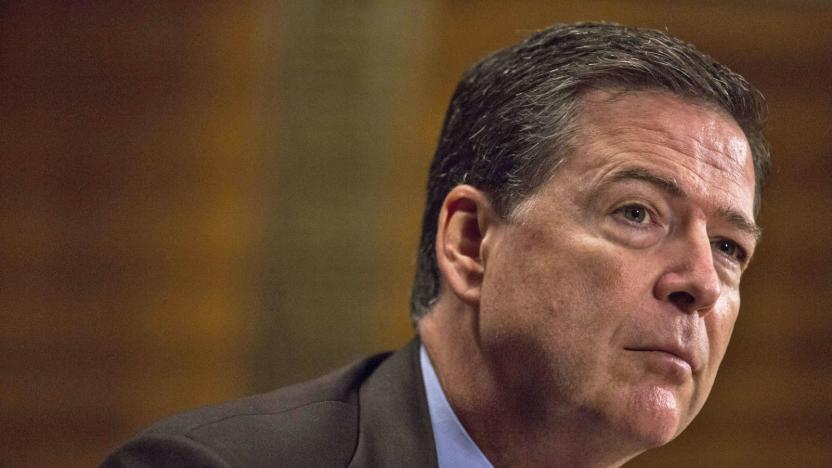
FBI director Comey backs renewed push for decryption law
If you were hoping that FBI Director James Comey had given up on legislation requiring that companies obey court-ordered decryption requests... you're about to be disappointed. In statements at a Senate committee, Comey supported Senator Dianne Feinstein's renewed effort to introduce a bill that would force companies to comply with decryption orders. Feinstein didn't say how close she was to submitting the legislation, but Comey claimed progress from his side. The tech industry had "come to see the darkness a little bit more," he says -- they supposedly understand the potential threat to public safety when law enforcement can't crack a device.

Anti-encryption bill changes would limit some effects on security
A Senate bill that would demand encryption backdoors may be on ice for now, but it's now poised to come back -- with a few limitations. Just Security claims to have obtained proposed changes to the bill that would scale back its requirements to placate critics of its effect on privacy and security. Some of them could make a meaningful difference, but there's a concern that this wouldn't change the underlying problems with the legislation.
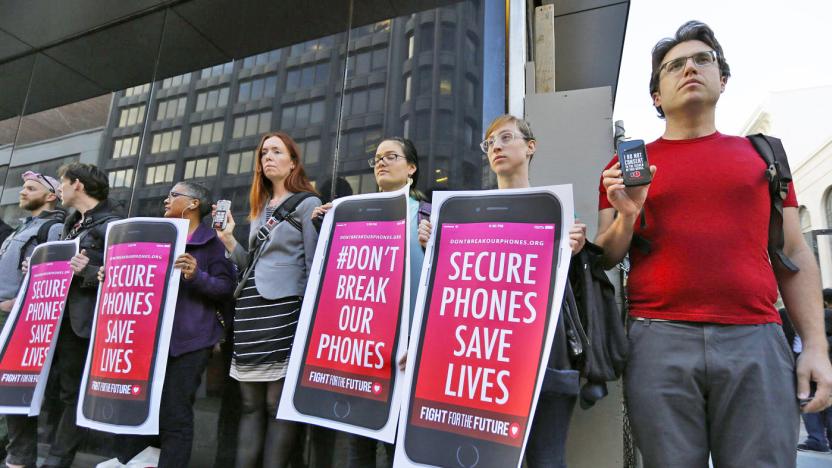
Senate anti-encryption bill is effectively dead, for now
If you were worried that a possible Senate bill requiring encryption backdoors would get enough support to become law, you can relax... for a while, at least. Reuters' government tipsters claim that the proposal, drafted by Senators Richard Burr and Dianne Feinstein, has lost most of its support. It won't be introduced this year, the insiders say, and would have no real chance even if it did go up for a vote. The White House's reluctance to back the bill (in public, anyway) is the main factor, but even the CIA and NSA were "ambivalent" knowing that it could hurt their own encryption.
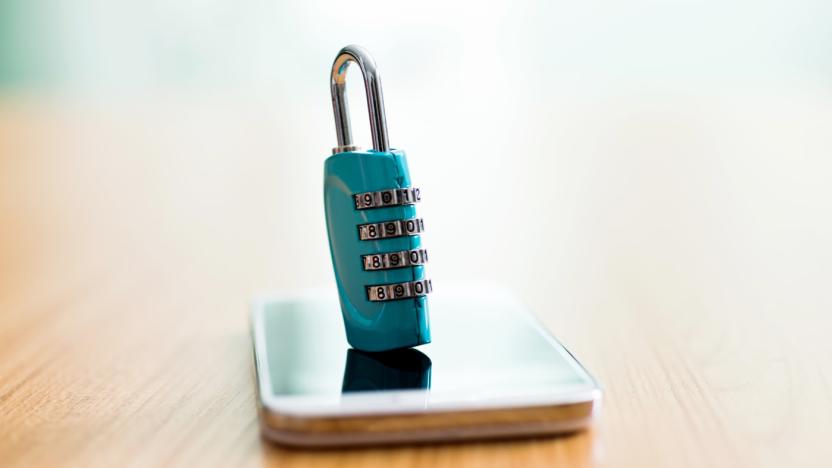
Read the full Senate bill requiring encryption backdoors
If you were skeptical that polticians would be so audacious as to propose a law effectively requiring encryption backdoors... well, you just got proof. The Senate has released a finished version of Richard Burr and Dianne Feinstein's Compliance with Court Orders Act, which demands that companies either produce data in a readable format when asked or else offer whatever help they can to make that data accessible. Despite the early uproar, little has changed between the draft and the finished bill -- the only big difference is that it explains which crimes can invoke the requirement. >Burr-Feinstein Encryption Bill by The Daily Dot
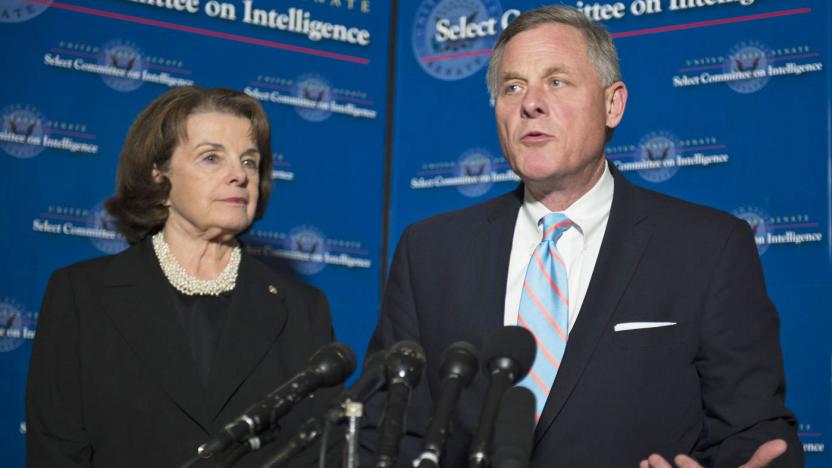
Senators work on what might be the most anti-encryption bill yet
The White House might have avoided serious backlash by refusing to back an encryption bill being worked on by the offices of Senators Richard Burr and Dianne Feinstein. Kevin Bankston, director of New America Foundation's Open Technology Institute, told Wired that in his 20 years working in tech policy, "this is easily the most ludicrous, dangerous, technically illiterate proposal" he's ever seen. Wired even notes that privacy experts thinks it's so bad, it's good, because it's very unlikely that the bill will become law as it is.

Reuters: White House refuses to openly back encryption law
The White House is apparently refusing to publicly back a law that would force tech companies to comply with decryption requests. Reuters has spoken to anonymous sources inside the administration that claim there are deep divisions on the issue of violating individual privacy. The new bill has been pushed by senators Richard Burr and Dianne Feinstein in the wake of the San Bernardino iPhone case. The legislation is designed to give judges the power to compel firms like Apple and WhatsApp to comply with requests to decrypt secure software.

Senator wants promises that net neutrality doesn't help terrorists
Telecoms and other net neutrality opponents usually try to paint the regulation as anti-free market, but they've lately raised the specter of terrorism. Supposedly, it might prevent internet providers from blocking extremist sites. It's a big enough concern, in fact, that Senator Dianne Feinstein wants reassurances that this isn't actually a problem. The California politician has written to the FCC asking it to "clarify" that net neutrality rules still let providers silence content that encourages illegal terrorist activity, such as the bomb-making instructions in al Qaeda's Inspire magazine. Feinstein doesn't necessarily believe the telcos' rhetoric, according to the letter -- she just wants to eliminate the ISPs' "confusion."





